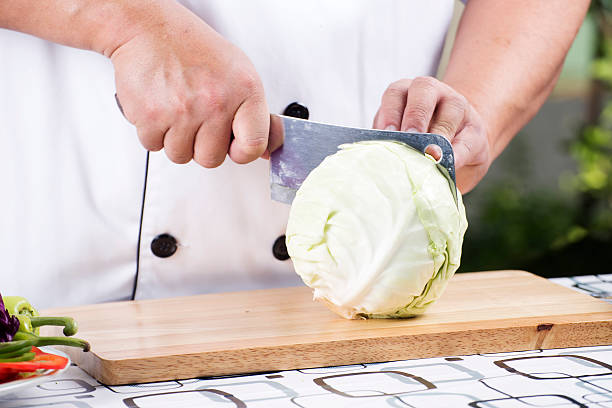
6 Potential Amazing Health Advantages of Cabbage
Cabbage, comprising several cultivars of Brassica oleracea, is a leafy green, red, or white biennial plant grown as an annual vegetable crop for its dense-leaved heads
At the point when you consider the nourishment realities and cell reinforcement properties of cabbage, obviously this crunchy and flexible cruciferous veggie is played down

A member from the Brassica class of cruciferous vegetables, cabbage imparts its natural legacy to veggie power players like kale, broccoli, and Brussels sprouts. Like these verdant green cousins, cabbage contains high measures of cell reinforcements, which might be answerable for its astounding rundown of potential medical advantages. Other than being packed with inflammation battling compounds, cabbage is high in nutrients C and K, which bring their own wellbeing supports.
All things considered, when you find its many benefits for your wellbeing, you might need to offer cabbage a position of high standing on your plate.
1. Cabbage Helps Lower Inflammation

Fundamentally, a lot of cabbage’s true capacity for wellbeing is its capacity to diminish inflammation. Each fresh leaf harbors various cancer prevention agents, the palatable substances known for removing unsafe free extremists.
Research in the International Journal of Food Sciences and Nutrition uncovered that kaempferol, quercetin, and apigenin are the most bountiful cancer prevention agents in green cabbage, while cyanidin is most common in red cabbage.
These may have huge wellbeing impacts. Kaempferol, for instance, has been connected to disease counteraction, and cyanins have hostile to diabetic, against malignant growth, and against heftiness impacts, research proposes.
Other accommodating compounds in cabbage incorporate glucosinolates. “At the point when thesecompounds are eaten and retained into the tissues, they respond with flagging proteins in the cells that produce cancer prevention agent and mitigating compounds, proteins, and other defensive particles by the cell,” says food researcher Bryan Q. Le, PhD, of Puyallup, Washington.
“[This process] assists the body with freeing itself of exceptionally responsive oxygen species and other harmful material items. This can prompt a decrease of irritation and oxidative pressure, which might give some insurance against cardiovascular sicknesses, cancer-causing agents, and metabolic problems like diabetes.”
2. Cabbage Might Assume a Part in Battling Malignant Growth
As of late, there’s been a lot of conversation around cruciferous veggies’ true capacity for battling disease. Cabbage falls under the cruciferous umbrella, having a remarkable framework of supplements that fit well in an enemy of malignant growth diet.

First of all, cabbage is high in L-ascorbic acid, with 25 milligrams for every cup, making it a superb source, as per the U.S. Branch of Farming (USDA). Research proposes that an eating regimen high in L-ascorbic acid could assume a part in forestalling pneumonic, bosom, and pancreatic diseases.
Then there are those useful glucosinolates once more. “In the wake of cutting, biting, or processing cabbage, glucosinolates separate into bioactive mixtures with expected mitigating properties,” makes sense of St Nick Monica, California-based oncology dietitian and culinary specialist Cindy Chou, RDN, of The Sound of Cooking and Malignant growth Nourishment in a Bowl. Research upholds this thought. “This might assist with the detoxification of cancer-causing agents,” she adds. One model: A concentrate on Chinese grown-ups presented to air contamination found that the people who consumed more glucosinolates had lower proportions of harmful substances in their pee.
Furthermore, a review distributed in April 2018 in The English Diary of Sustenance showed that eating cruciferous veggies like cabbage was related with lower bosom disease risk. Other exploration in Archives of Oncology connected cabbage with decreased hazard of colon disease.
4. Cabbage Assists With Blood Coagulating and Bone Wellbeing
Vitamin K may not be the most buzzworthy supplement, yet it’s not without its advantages for wellbeing. . As the National Institutes of Health notes, K is answerable for significant capabilities like aiding your blood coagulation appropriately and supporting sound bones. Luckily, cabbage is a brilliant source, with 53 micrograms for every cup, per the USDA.

One K caveat: This nutrient is fat-dissolvable, so while getting ready cabbage, make certain to incorporate a source of dietary fat to guarantee retention. As per rancher Amanda Terillo, RDN, who is situated in Barboursville, Virginia, this ought not be excessively troublesome. “Numerous food varieties that you would cook with cabbage will normally have fat, like meat and greasy fish,” she says. “Alternate ways of including fats could be adding avocado to tacos with cabbage, involving oil-based salad dressings in your cabbage salad, and using a decent quality mayonnaise to make coleslaw.”
5. Cabbage Is Great for Digestion
As a decent source of fiber, cabbage could limit stomach related diarrhea and constipation. The veggie’s insoluble fiber is a specific legend of stomach related aid since it adds mass to stool and advances normal defecations, the Mayo Clinic notes. For certain individuals, nonetheless, sulfuric compounds in cabbage could cause gas and bulging. You might have to analysis to decide your degree of resistance.
For a one-two punch for stomach related wellbeing, consider adding farmented cabbage (otherwise known as kimchi) to meals and snacks.. “Kimchi contains the Lactobacillus bacterium.

These lactic acid microorganisms have probiotics with wellbeing advancing properties that can assist with working on our processing and backing the stomach microbiome by making a different combination of stimulating organisms in the digestion tracts,” says Chou. A review distributed in November 2021 in Food varieties found that food varieties matured with Lactobacillus could regulate the stomach’s reaction to stress. Furthermore, a review distributed in July 2020 in The Journal of Nutrition presumed that farmented food sources assist with overcoming stomach dysbiosis (the irregularity of stomach microorganisms that can prompt irritation).
6. Cabbage Is High in L-ascorbic acid (Vitamin C)
You could connect L-ascorbic acid with citrus natural products like oranges and lemons, however don’t limit cabbage for a boost, as well. Notwithstanding its potential enemy of disease impacts, the L-ascorbic acid in cabbage offers a few rewards for your wellbeing — beginning with your skin. It could advance a more young appearance, as it advances collagen creation, as examination proposes.
Furthermore, some examination has connected more significant levels of L-ascorbic acid with UV protection and diminished indications of skin maturing.
The selling points of C don’t stop there! “L-ascorbic acid additionally supports wound recuperating, works on the immune system, diminishes the seriousness of specific periodontal sicknesses, and retains iron, one more significant mineral for the body,” says Terillo. “Iron can emerge out of heme (animal) or nonheme (nonanimal) sources, however heme iron is retained awesome.” To benefit from heme iron and L-ascorbic acid, Terillo proposes making cabbage as a side dish to sheep or another red meat dish, or making a sardine sandwich with slashed cabbage on top.
7. Cabbage Boosts Heart Health

Cardiovascular wellbeing and inflammation are inseparably connected — so it’s nothing unexpected that cell reinforcement rich cabbage is a heart-good food. Some research has shown that the kaempferol and quercetin found in green cabbage and the cyanins in red cabbage could advance sound heart capability. In the mean time, a review distributed in February 2021 in The British Journal of Nutrition that followed the weight control plans of more established ladies found that the people who ate more cruciferous veggies had less stomach aortic calcification, which is a risk factor for cardiovascular occasions. To advance heart wellbeing — and various different advantages — snatch a cabbage and crunch away!






-
-
2 days
Tagged exercise, Fitness, Healthy living